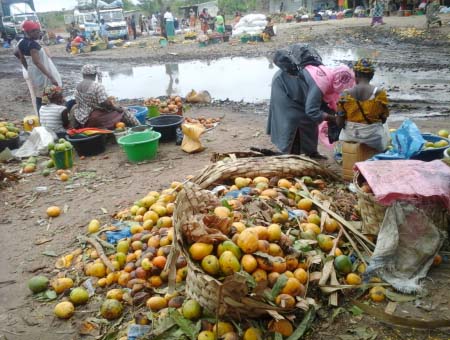
(Issue, Monday, August 22, 2016)
Mr
Momodou Mbye Jabang and other horticultural scientists have been
typographically drumming up concern about large amounts of fruit and vegetable
loss during maturity and harvest.
It
is estimated that up to 10% of the value of fresh fruits and vegetables is lost
in the process of marketing (Fatajo, Hydara and Jabang).
One
of Africa’s main challenges particularly in The Gambia is the processing and
the preservation of fruits, let alone the fruit to get ripe, sell very few
fresh of the harvest and tonnes of others rubbished.
Economic
liberalization and institutional reform has reduced and redefined the roll of
the state in agricultural service provision and the challenge is ownership by
emerging private sectors.
The
indigenous sectors, however, are reluctant risking investment even in
standardized processing of fruits more so vegetables due to belief that the
local market and consumers could discard their produce and go in for the
imported processed products.
Fruit
and vegetable farmers, the majority of whom are women, could however be
encouraged to boost production through the provision of a mechanism that can
quickly buy and adequately pay for their produce thereby encouraging them to
produce more, and in turn buyers, to either process and preserve it for local
and international markets.
It
is therefore imperative for a modern fruit factory to be set up so that once
these fruits are harvested, disastrous quality losses are averted and prevented
from occurring.
There
are two sides to the journey to agriculture, namely production and processing,
so that the latter can maintain the quality of the fruit longer in the food
chain before marketing.
Much
research effort has been conducted in the area of production but little in the
area of processing; fruit farmers appeared not to have bordered about telling
researchers to carefully conduct their researches upon both sides of the coin;
that is, in the areas of production and fruit processing in The Gambia.
The
role of horticultural sub-sector in an economy cannot be overemphasized;
however, expansion in the sub-sector is constrained by lack of a local
processing factory for fruits and vegetables, leaving the producers frustrated
and demotivated to increase their production acreages.
Having
a heavy duty standby factory and efficient processing system is key in boosting
production and enabling fresh farm products to be moved quickly to their
salvation depot which is either the processing factory or preservative stores
before reaching the market.
Mullins
(2002) argues that fruits and vegetables are usually more difficult to market
than to produce.
Not
only the agricultural sector in most African countries received support in
terms of investment and incentive measures but such support was mainly directed
to export crops (Adedeji and Hussein, 1988).
Again
it is only cash crops that have established marketing system by marketing
boards, but such a valuable food crop, like tomato, has no established
marketing programme (Anyanwu, 1981).
Fruits
and vegetables are highly perishable commodities. Their quality begins to
deteriorate from the moment of harvest and continues throughout the marketing
process. There is urgency in processing, packaging of these produce efficiently
as quickly as possible to maintain their farm fresh value. The entire
distribution process is geared mainly towards rapid processing, packaging here
in The Gambia and marketing.
It
is estimated that up to 10% of the value of fresh fruits and vegetables is lost
in the process of marketing (Fatajo, Hydara and Jabang.
The
quick processing of tomatoes, mangoes, oranges, melons etc., canning and
bottling them in a Gambian factory would preserve their freshness and let them
wait longer.
There
are only two major monopolistic factories in the whole country involved in
fruit production; yet they are not capable of buying and preventing tonnes of
fresh fruits and vegetables from spoiling. And again, the handfuls of tonnes
they are processing are sold at exorbitant costs.
Elaborate
and fast marketing channels, facilities, and equipment are necessary for
maintaining and enhancing the quality of fresh fruits and vegetables during
marketing (Kohls et al., 1998).
The
scanty literature on gardening in The Gambia stresses that the wholesome
marketing of fresh fruits and vegetables are the major bottlenecks for growers
to further expanding the garden sector.
Fruits
and vegetables here in The Gambia are either eaten or a handful marketed fresh
or else the majority of the produce becomes rubbished.
Generally,
significant quantities of agricultural produce in The Gambia are not
effectively marketed, for most have got zero value addition; therefore, the
need to formulate effective and efficient marketing strategies that can enable
producers to better market their produce through processing, packaging,
bottling and canning is paramount and long overdue.
Fruits
and vegetable gardening have always been an integral part of Gambian life,
especially for women. Women have traditionally worked in communal or individual
gardens primarily to supplement household diets and, to a lesser extent, to
sell their surpluses in local markets. With recent liberalization of the
economy and the increased demand for fresh produces in domestic and international
markets, several private entrepreneurs have entered into commercial
horticultural production.
Furthermore,
several Non-Governmental Organizations (NGOs) actively sponsored communal
gardens to promote income generating activities in rural and peri-urban areas
and many targeted women producers.
As
a result, horticultural production has expanded in the past decade to include
heterogeneous producers ranging from small indigenous communal and individual
farmers to commercialized large producers and cooperatives (Nagarajan et al.,
1994).
The
Government of The Gambia has identified the horticultural sector as a potential
for earning more foreign exchange and creating additional employment.
Therefore,
the Gambia government is encouraging private entrepreneurs to ship in factories
to add value to tonnes of her horticultural crops for local and international
markets, which eventually spoils annually.





